Politics
In Tim Walz's rural hometown, his Democratic politics are an awkward fit
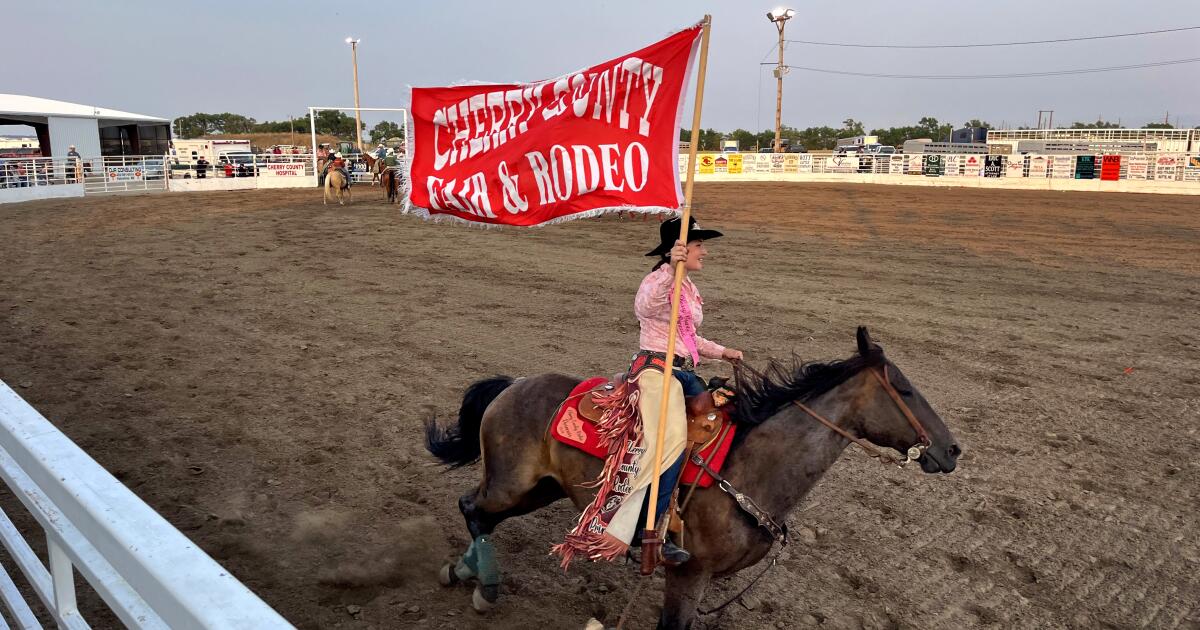
Mayor Kyle Arganbright steered his dusty diesel truck through this ranching town, past the rodeo grounds and livestock auction, and pointed out the football field of the Valentine High School Badgers, whose roster once included a teenage Tim Walz. Next up: the quiet, tree-lined street where the Walz family once lived.
After Walz, the Minnesota governor, was named Vice President Kamala Harris’ running mate, reporters descended on his hometown of Valentine, population 2,600.
“Now I’m the local Tim Walz tour guide. Write that on the list of things I never thought I’d do,” Arganbright said with a laugh as a fishing rod, stretching from the back seat, rattled on his dashboard.
Harris and Walz come from vastly different worlds.
Harris is the biracial daughter of immigrants whose career was forged by the rough-and-tumble Democratic politics of the Bay Area — a place nationally synonymous with West Coast liberalism.
Walz is a white guy who spent formative years in Valentine, the remote seat of Cherry County, the nation’s top producer of beef cows.
Walz leans heavily on his upbringing, and during a campaign stop in Los Angeles this week, he even walked onstage to the John Mellencamp song “Small Town.”
But here in Cherry County — where former President Trump won 87% of the vote in 2020 — the presence of a hometown boy on the Democratic ticket is, well, a little awkward.
Asked if Walz might flip many votes, Arganbright chuckled.
“Um, no,” he said.
Vice President Kamala Harris’ running mate, Tim Walz, grew up in Valentine, population 2,600.
(Hailey Branson-Potts / Los Angeles Times)
Arganbright, a fifth-generation Valentinian, said most voters here are Republicans with a leave-me-alone libertarian bent.
“If Tim Walz came back, I bet someone would buy him a beer if they saw him and say, ‘Hey, welcome home, man,’” he said. “People are very accommodating. But they’re not going to give up on their principles to impress somebody.”
Arganbright would not say whom he will be voting for — but said it might be a hint of his party preference that he once interned for Nebraska-born former Vice President Dick Cheney and that one of his young nephews had a show steer named Donald.
With Harris tapping Walz and Trump picking as his running mate Ohio Sen. JD Vance — whose bestselling “Hillbilly Elegy” chronicled his impoverished upbringing in the Rust Belt and Appalachia — the race has become, in part, a contest of rural bona fides.
Though the Trump campaign branded Walz “a West Coast wannabe,” Democrats are betting Walz will help them broaden their appeal in overwhelmingly white swaths of rural America, where the party has been trying to claw back voters after two decades of steep losses.
The country’s urban-rural political divide — evident even in California, where conservative northern counties have long talked of seceding to form their own State of Jefferson— has only grown wider since Trump was elected in 2016.
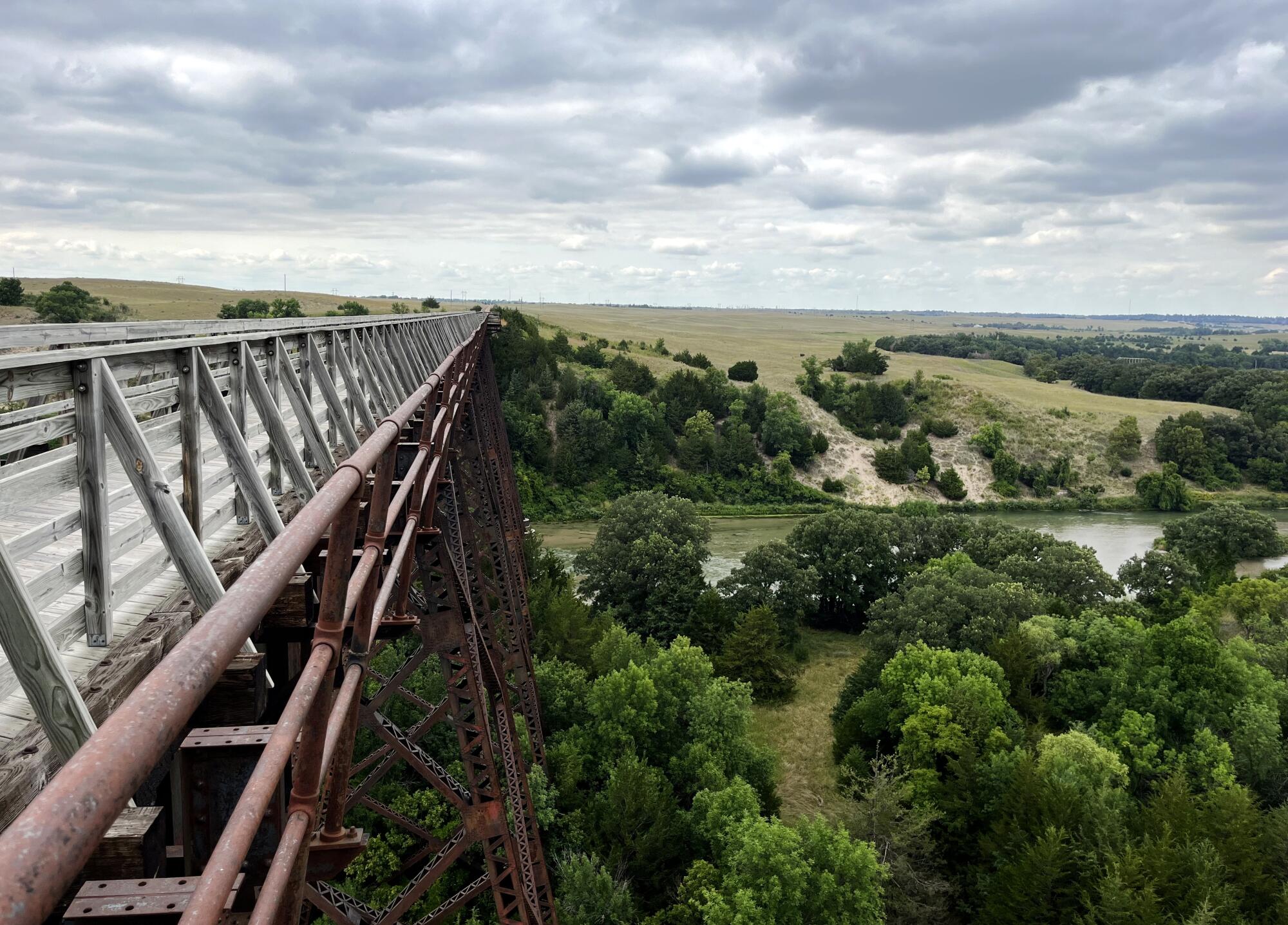
The Niobrara River bridge on the Cowboy Trail, a hiking and biking path along a former railroad track in Valentine.
(Hailey Branson-Potts / Los Angeles Times)
For urban Democrats, “it’s as if rural America has become a throwaway, and that lack of interest morphed into enormous resentment after Trump was elected,” said Lisa Pruitt, a professor at the UC Davis School of Law and president-elect of the Rural Sociological Society.
During the 2022 midterm elections, 69% of rural voters cast ballots for Republicans, compared with 29% supporting Democrats, according to the Pew Research Center. Among urban voters, 68% supported Democrats and 30% backed Republicans.
Randy Adkins, a political scientist at the University of Nebraska Omaha, said he does not see places like Nebraska suddenly going blue.
“What we’re seeing in the polls right now is there’s a little bit of movement toward Harris, but people made hard decisions and they made them a long time ago,” he said.

A building under construction along the newly refurbished Main Street in Valentine.
(Hailey Branson-Potts / Los Angeles Times)
Still, there is palpable excitement among rural Democratic organizers, who say they have long been overlooked by their national party.
Jane Kleeb, chair of the Nebraska Democratic Party, said in an email that Harris “has absolutely expanded the map beyond swing states with Tim Walz” and that “we do not have to hand him a briefing book on rural issues, because he has lived our experiences.”
Among Democrats’ many identity-based Zoom fundraising calls that have raised millions — including “White Dudes for Harris” — was an event last week called “Rural Folks for Harris.” It drew about 6,000 listeners across 48 states and raised $22,000.
In Valentine, there were no visible yard signs for Harris or Trump this week. At the Cherry County Rodeo, people donned cowboy hats, not MAGA caps.
The rodeo clown wondered aloud if one cowboy in a green shirt had actually “gone green” and had an electric pickup truck in the parking lot. It was a wink-wink joke in this far-flung town with no electric vehicle chargers, where such vehicles are seen not only as impractical — it is 130 miles to the nearest Walmart — but as a whiff of liberalism.
Arganbright — whose 7-year-old daughter rode a sheep bareback for just over two seconds in the rodeo’s mutton-bustin’ contest — is amused by the sudden, if fleeting, national interest that Walz’s selection has brought to Valentine. He hopes to use the spotlight to highlight positive things, like the just-finished, multimillion-dollar overhaul of Main Street.
But, he said, there are pressing issues here in vast Cherry County, where the population has dropped nearly 11% since 2000, to roughly 5,500 residents. Residents have struggled with high inflation, job losses as agricultural work becomes more mechanized, and a lack of child care and affordable housing.
As for people’s views of the federal government? One of the best examples, he said, of how “federal policies aren’t taken great locally” is the federally established time zone line, which, until the late 1960s, ran along Main Street, splitting Valentine between Mountain and Central time.
He said it took the government too long to fix it — although some bars are said to have benefited by opening on the west side of town, where they could stay open an hour later.
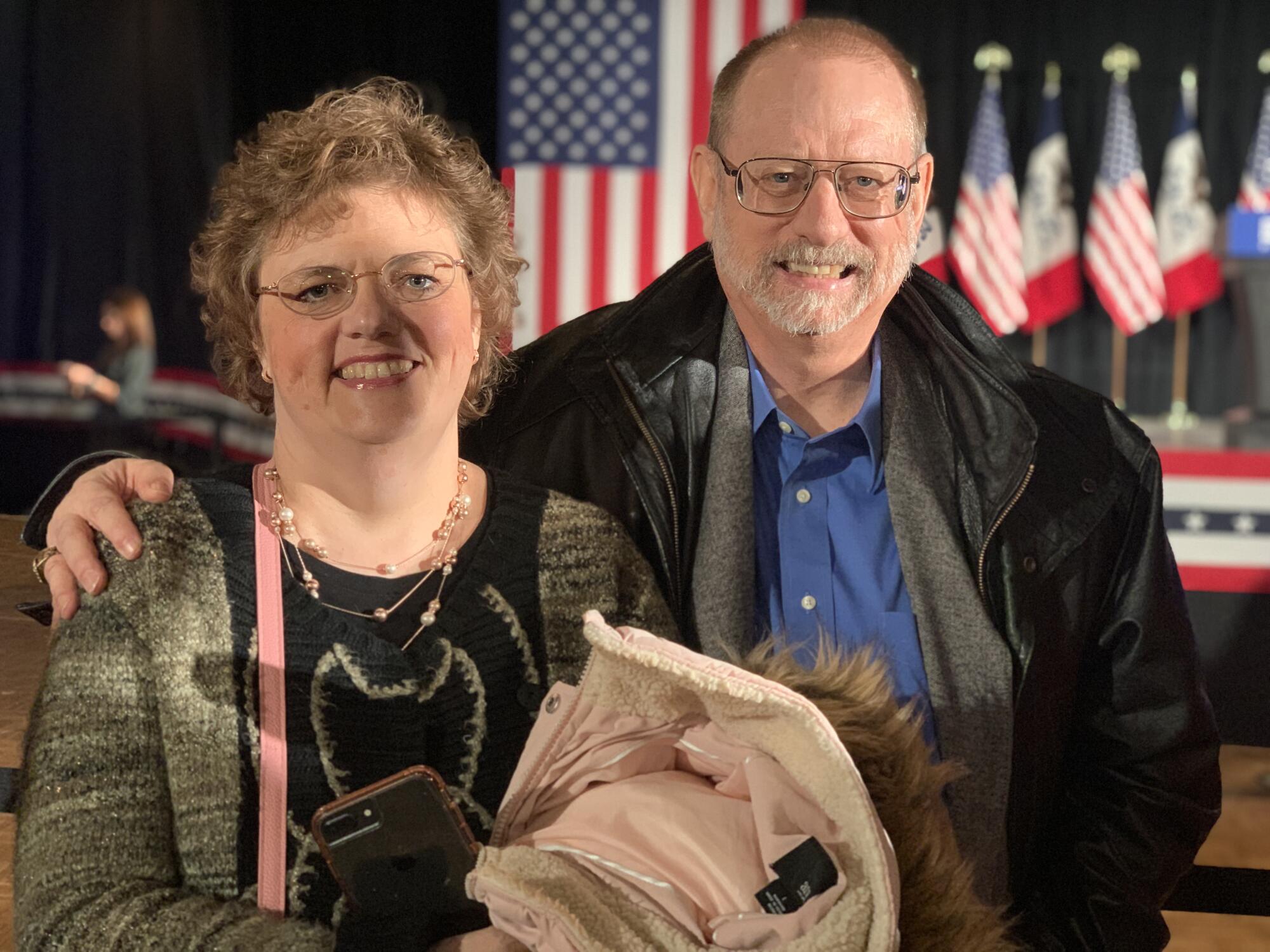
Bud Pettigrew, with wife Angie at the 2020 Democratic Iowa caucuses, attended Valentine High School with Tim Walz and is a former Nebraska Democratic Party official.
(Melanie Mason / Los Angeles Times)
Bud Pettigrew, who attended Valentine High School with Walz and is a former Nebraska Democratic Party official, said he’s heard mixed reactions in the Cornhusker State to the vice presidential nod.
“The people who are Democrats or open-minded independents are all thrilled about Tim,” said Pettigrew, former Marine and high school teacher. “The MAGA-type Republicans, they don’t care. He’s just another liberal. Once you move away, you don’t count anymore. You hear this a lot from rural people.”
Pettigrew, 63, was a senior when Walz was a freshman quarterback on the junior varsity team. Pettigrew saw in Walz “a pretty tough kid who had some ability.”
Walz’s father was the school superintendent, and Pettigrew remembers him fighting for a school bond — not an easy feat in a fiscally conservative town — to replace the 1897 schoolhouse said to be haunted by the ghost of a student who died after someone poisoned her clarinet reed.
Pettigrew is planning to vote for Harris and Walz.
Darlene Meyer, who owns the Plains Trading Company bookstore on Main Street, said she “was frightened” when she learned Harris was running — not because she dislikes her, but because she figured too many conservatives would refuse to vote for her because she’s a woman, because she’s Black and Asian American, and because she’s from California.
“How many strikes can you have against you?” she said. Walz, she added, was a smart choice.
Meyer is a registered Republican but not a party-line voter. She does not like Trump and said it was frustrating that he politicized masks during the COVID-19 pandemic lockdown.
Meyer, a septuagenarian and longtime nurse, still requires masks in the bookstore, a 1914 building with poor ventilation. A few people have spit on the floor in protest. Others boycotted.
Still, Meyer tries to avoid discussing politics.
“There’s plenty else to talk about. The weather. Grasshoppers.”
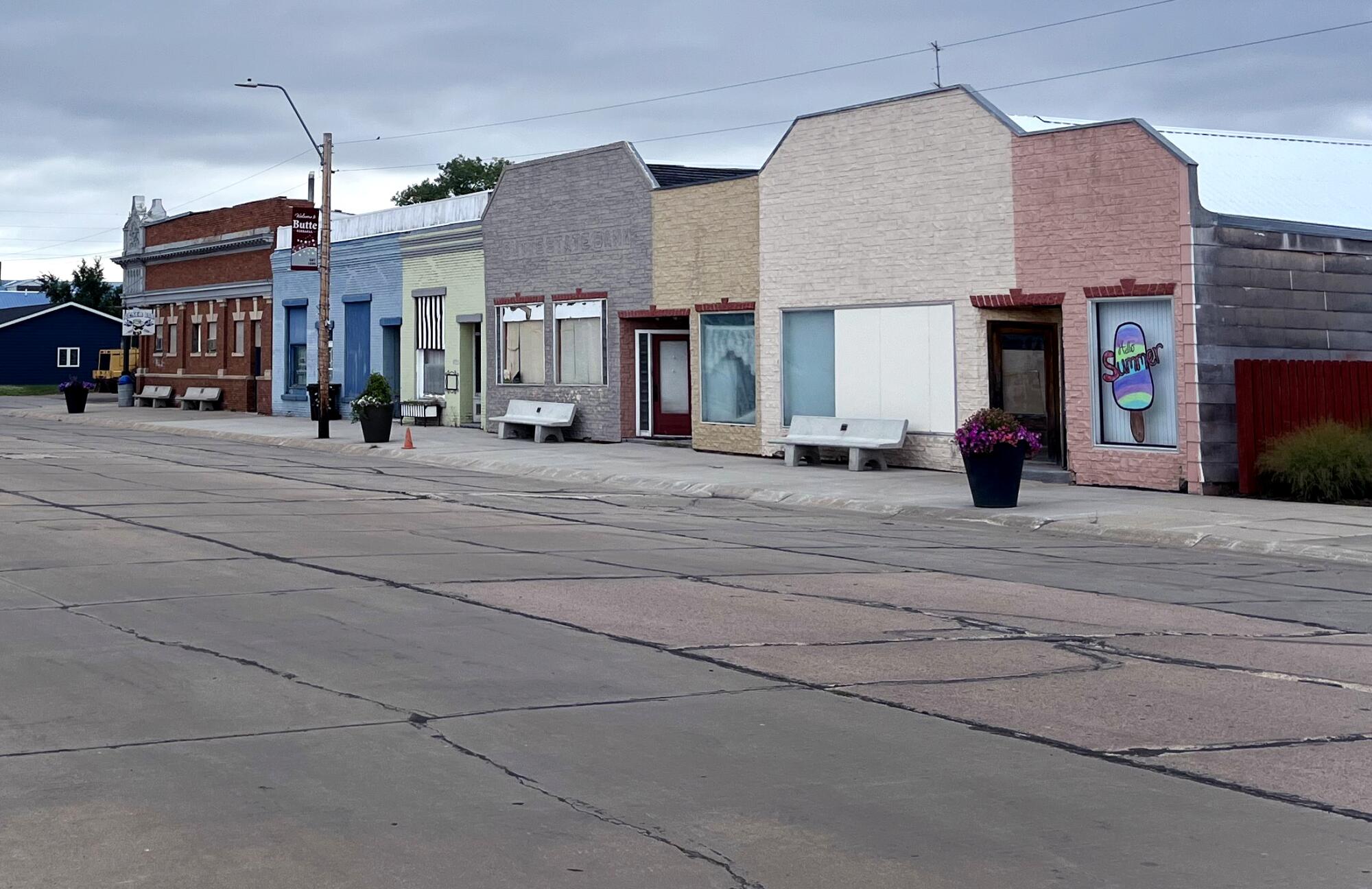
The quiet main drag in Butte, Neb., where Walz moved with his family when he was a teenager.
(Hailey Branson-Potts / Los Angeles Times)
When he was a sophomore, Walz moved with his family 100 miles east to the farm town of Butte to be near relatives after his father was diagnosed with lung cancer. His dad died when he was 19.
Butte, which had a population of around 500 back then, has shrunk to about half that size. Butte High School — from which Walz graduated in 1982 among a class of 25 students — closed years ago. A fading mural downtown reads: “Save the Rural Schools.”
A Trump 2024 flag flies alongside the American flag next to the Butte Community Center.
Walz’s mother, Darlene, still lives in town, and some residents said that while they don’t agree with her son’s politics, they try not to talk about it because they don’t want to hurt her feelings.
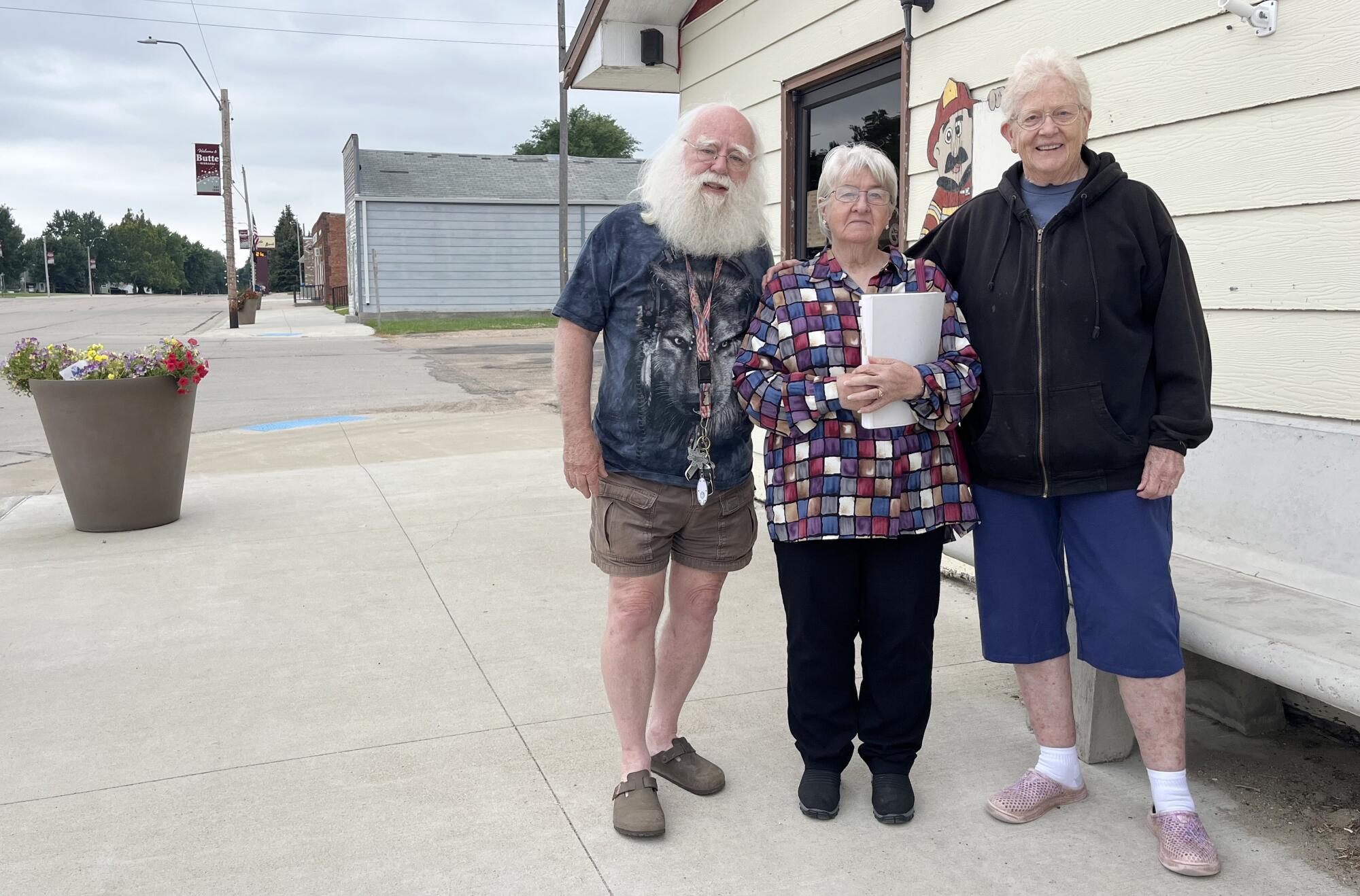
Richard Meadows, from left, Dorothy Boes and Francine Meadows are friends of Tim Walz’s mom, Darlene, in Butte, Neb.
(Hailey Branson-Potts / Los Angeles Times)
Dorothy Boes, a retired special education teacher who lives just over the South Dakota line, goes to church in Butte and is in a women’s coffee group with Darlene Walz.
Boes does not like the way Trump “talks about and bad-mouths women” and was outraged by the Jan. 6, 2021, insurrection. She worries about more potential violence.
“I just feel like he’s not going to go quietly into the night if he doesn’t win,” she said.
Boes, 77, does not know much about Walz’s political record. But she knows that he comes back to Butte often to take care of his mom and that he frequently brings her to Minnesota.
“Those are good, positive things, and, in my heart, I feel that he deserves a chance. And so does she,” Boes said of Walz and Harris. Boes is a longtime Republican who voted twice for Trump — but is undecided this year.
Richard Meadows, an 81-year-old “die-hard Democrat” who mows Darlene’s lawn, said he and his wife “coexist” peacefully with their Republican neighbors in Butte.
But Meadows — who has a chest-length white beard and worked for years as a professional St. Nick — knows who’s getting his vote.
“Santa Claus is gonna vote for Tim and Kamala.”
As for Valentine? Its post office gets inundated with packages every February by romantics who want a holiday-themed postmark. But the town is not named for St. Valentine.
It is named for Edward K. Valentine, a Union soldier during the Civil War and a congressman.
He was a Republican.

Politics
Trump signs order to protect Venezuela oil revenue held in US accounts

NEWYou can now listen to Fox News articles!
President Donald Trump has signed an executive order blocking U.S. courts from seizing Venezuelan oil revenues held in American Treasury accounts.
The order states that court action against the funds would undermine U.S. national security and foreign policy objectives.
CLICK HERE TO DOWNLOAD THE FOX NEWS APP
President Donald Trump is pictured signing two executive orders on Sept. 19, 2025, establishing the “Trump Gold Card” and introducing a $100,000 fee for H-1B visas. He signed another executive order recently protecting oil revenue. (Andrew Harnik/Getty Images)
Trump signed the order on Friday, the same day that he met with nearly two dozen top oil and gas executives at the White House.
The president said American energy companies will invest $100 billion to rebuild Venezuela’s “rotting” oil infrastructure and push production to record levels following the capture of Venezuelan dictator Nicolás Maduro.
The U.S. has moved aggressively to take control of Venezuela’s oil future following the collapse of the Maduro regime.
This is a developing story. Please check back for updates.
Politics
Column: Some leaders will do anything to cling to positions of power

One of the most important political stories in American history — one that is particularly germane to our current, tumultuous time — unfolded in Los Angeles some 65 years ago.
Sen. John F. Kennedy, a Catholic, had just received his party’s nomination for president and in turn he shunned the desires of his most liberal supporters by choosing a conservative out of Texas as his running mate. He did so in large part to address concerns that his faith would somehow usurp his oath to uphold the Constitution. The last time the Democrats nominated a Catholic — New York Gov. Al Smith in 1928 — he lost in a landslide, so folks were more than a little jittery about Kennedy’s chances.
“I am fully aware of the fact that the Democratic Party, by nominating someone of my faith, has taken on what many regard as a new and hazardous risk,” Kennedy told the crowd at the Memorial Coliseum. “But I look at it this way: The Democratic Party has once again placed its confidence in the American people, and in their ability to render a free, fair judgment.”
The most important part of the story is what happened before Kennedy gave that acceptance speech.
While his faith made party leaders nervous, they were downright afraid of the impact a civil rights protest during the Democratic National Convention could have on November’s election. This was 1960. The year began with Black college students challenging segregation with lunch counter sit-ins across the Deep South, and by spring the Student Nonviolent Coordinating Committee had formed. The Rev. Martin Luther King Jr. was not the organizer of the protest at the convention, but he planned to be there, guaranteeing media attention. To try to prevent this whole scene, the most powerful Black man in Congress was sent to stop him.
The Rev. Adam Clayton Powell Jr. was also a warrior for civil rights, but the House representative preferred the legislative approach, where backroom deals were quietly made and his power most concentrated. He and King wanted the same things for Black people. But Powell — who was first elected to Congress in 1944, the same year King enrolled at Morehouse College at the age of 15 — was threatened by the younger man’s growing influence. He was also concerned that his inability to stop the protest at the convention would harm his chance to become chairman of a House committee.
And so Powell — the son of a preacher, and himself a Baptist preacher in Harlem — told King that if he didn’t cancel, Powell would tell journalists a lie that King was having a homosexual affair with his mentor, Bayard Rustin. King stuck to his plan and led a protest — even though such a rumor would not only have harmed King, but also would have undermined the credibility of the entire civil rights movement. Remember, this was 1960. Before the March on Washington, before passage of the Voting Rights Act, before the dismantling of the very Jim Crow laws Powell had vowed to dismantle when first running for office.
That threat, my friends, is the most important part of the story.
It’s not that Powell didn’t want the best for the country. It’s just that he wanted to be seen as the one doing it and was willing to derail the good stemming from the civil rights movement to secure his own place in power. There have always been people willing to make such trade-offs. Sometimes they dress up their intentions with scriptures to make it more palatable; other times they play on our darkest fears. They do not care how many people get hurt in the process, even if it’s the same people they profess to care for.
That was true in Los Angeles in 1960.
That was true in Washington, D.C., on Jan. 6, 2021.
That is true in the streets of America today.
Whether we are talking about an older pastor who is threatened by the growing influence of a younger voice or a president clinging to office after losing an election: To remain king, some men are willing to burn the entire kingdom down.
YouTube: @LZGrandersonShow
Politics
Federal judge blocks Trump from cutting childcare funds to Democratic states over fraud concerns

NEWYou can now listen to Fox News articles!
A federal judge Friday temporarily blocked the Trump administration from stopping subsidies on childcare programs in five states, including Minnesota, amid allegations of fraud.
U.S. District Judge Arun Subramanian, a Biden appointee, didn’t rule on the legality of the funding freeze, but said the states had met the legal threshold to maintain the “status quo” on funding for at least two weeks while arguments continue.
On Tuesday, the U.S. Department of Health and Human Services (HHS) said it would withhold funds for programs in five Democratic states over fraud concerns.
The programs include the Child Care and Development Fund, the Temporary Assistance for Needy Families program, and the Social Services Block Grant, all of which help needy families.
USDA IMMEDIATELY SUSPENDS ALL FEDERAL FUNDING TO MINNESOTA AMID FRAUD INVESTIGATION
On Tuesday, the U.S. Department of Health and Human Services said it would withhold funds for programs in five Democratic states over fraud concerns. (AP Photo/Jose Luis Magana, File)
“Families who rely on childcare and family assistance programs deserve confidence that these resources are used lawfully and for their intended purpose,” HHS Deputy Secretary Jim O’Neill said in a statement on Tuesday.
The states, which include California, Colorado, Illinois, Minnesota and New York, argued in court filings that the federal government didn’t have the legal right to end the funds and that the new policy is creating “operational chaos” in the states.
U.S. District Judge Arun Subramanian at his nomination hearing in 2022. (Tom Williams/CQ-Roll Call, Inc via Getty Images)
In total, the states said they receive more than $10 billion in federal funding for the programs.
HHS said it had “reason to believe” that the programs were offering funds to people in the country illegally.
‘TIP OF THE ICEBERG’: SENATE REPUBLICANS PRESS GOV WALZ OVER MINNESOTA FRAUD SCANDAL
The table above shows the five states and their social safety net funding for various programs which are being withheld by the Trump administration over allegations of fraud. (AP Digital Embed)
New York Attorney General Letitia James, who is leading the lawsuit, called the ruling a “critical victory for families whose lives have been upended by this administration’s cruelty.”
New York Attorney General Letitia James, who is leading the lawsuit, called the ruling a “critical victory for families whose lives have been upended by this administration’s cruelty.” (Win McNamee/Getty Images)
CLICK HERE TO DOWNLOAD THE FOX NEWS APP
Fox News Digital has reached out to HHS for comment.
-

 Detroit, MI7 days ago
Detroit, MI7 days ago2 hospitalized after shooting on Lodge Freeway in Detroit
-

 Technology4 days ago
Technology4 days agoPower bank feature creep is out of control
-

 Dallas, TX5 days ago
Dallas, TX5 days agoDefensive coordinator candidates who could improve Cowboys’ brutal secondary in 2026
-

 Dallas, TX2 days ago
Dallas, TX2 days agoAnti-ICE protest outside Dallas City Hall follows deadly shooting in Minneapolis
-

 Iowa4 days ago
Iowa4 days agoPat McAfee praises Audi Crooks, plays hype song for Iowa State star
-

 Delaware1 day ago
Delaware1 day agoMERR responds to dead humpback whale washed up near Bethany Beach
-

 Health6 days ago
Health6 days agoViral New Year reset routine is helping people adopt healthier habits
-

 Nebraska4 days ago
Nebraska4 days agoOregon State LB transfer Dexter Foster commits to Nebraska

















